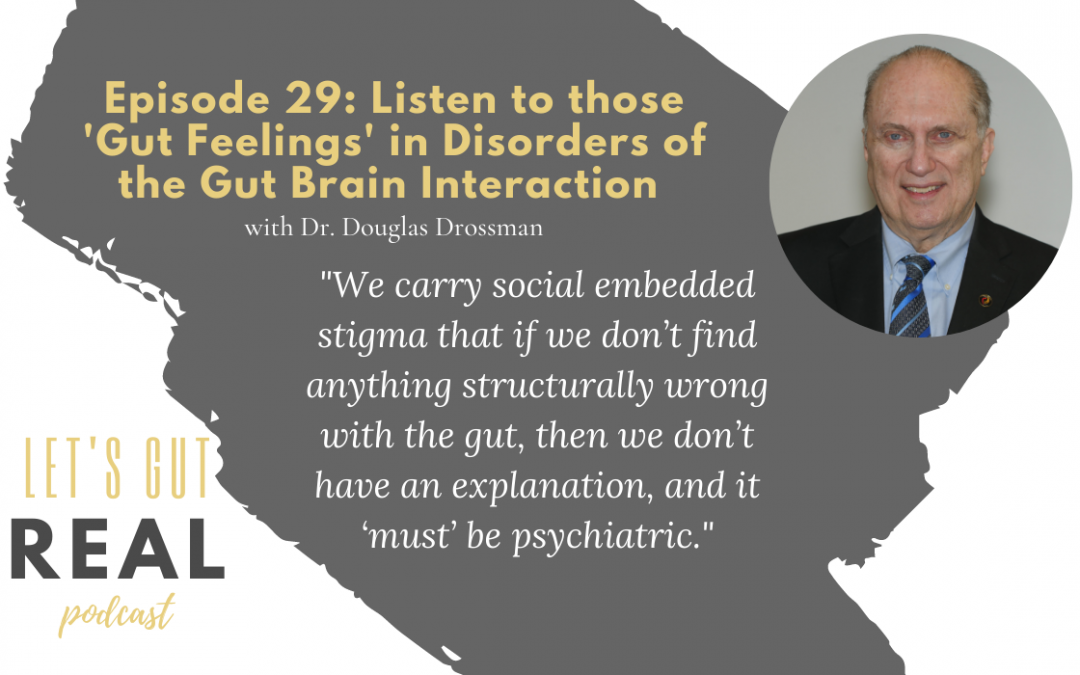Did you know, the way we’ve framed bodily issues as separate from our mind has shaped (and stigmatized) how we treat patients? Dr. Drossman shares his immense expertise on neurogastroenterology and disorders of the gut brain interaction (DGBI)
Nutrition Pearls for DGBI’s
- Language for ‘functional gut disorders’ has shifted to ‘disorders of the gut brain interaction’ to not only be less stigmatizing, but to also reflect our understanding of these disorders involving visceral hypersensitivity, motility, immune modulation, and the gut microbiome, and its influence on the gut-brain axis
- as practitioners we need to understand the history of stigma around ‘non-structural’ disease so we can provide effective patient care
- learning to properly listen to our patients doesn’t necessarily take more time, it takes a different set of skills. To learn more, pick up your copy of Dr. Drossman’s new book ‘Gut Feelings- Disorders of the Gut Brain Interaction and the Patient-Doctor Relationship‘
Dr. Drossman received his M.D. degree at Albert Einstein College of Medicine and subspecialized in biopsychosocial medicine and Gastroenterology. He received his gastroenterology training at the University of North Carolina where he founded the UNC for Functional GI and Motility Disorders. Currently he is Professor Emeritus of Medicine and Psychiatry in Gastroenterology at UNC. He is a Fellow of the American College of Physicians, a Master of the American College of Gastroenterology, Past-President of the American Psychosomatic Society (1997) and Founder and President of the Rome Foundation for 29 years. In addition, he founded the Drossman Center for the Education and Practice of Biopsychosocial Care as an entity to help train physicians in relationship-centered biopsychosocial care with an emphasis on communication skills and enhancing the patient-doctor relationship.
Most recently he has released a book co-authored by a patient advocate: Gut Feelings: Disorders of Gut-Brain Interaction and the Patient-Doctor Relationship
Dr. Drossman and I talk about:
- Dr. Drossman’s background and how he became involved in neurogastroenterology
- why did we shift from ‘functional gut disorders’ to ‘disorders of the gut-brain interaction’ and why is this important?
- what is ‘mind body dualism’ and how has it influenced medicine and patient care?
- how has the field of neurogastroenterology evolved?
- how does this shift in approach help us to provide better care and interventions for patients & improving the patient doctor relationship?
- what types of therapies are evidence-based to help treat DGBI’s
- Dr. Drossman’s tips for health care providers improve relationships with their patients to provide good quality care
You can learn more about Dr. Drossman and pick up a copy of his amazing new book, ‘Gut Feelings- Disorders of the Gut Brain Interaction and the Patient-Doctor Relationship‘



Can you provide link to review article by Nicholas Talley about subtypes of IBS?
Yes absolutely!
Functional Gastrointestinal Disorders? A Proposed Disease Model. Am J Gastroenterol. 2020 Jan;115(1):41-48. doi: 10.14309/ajg.0000000000000485.